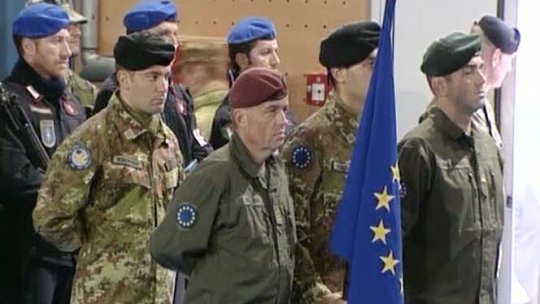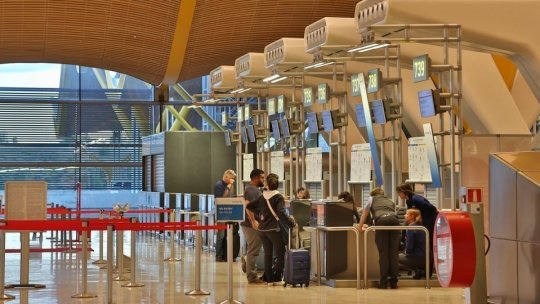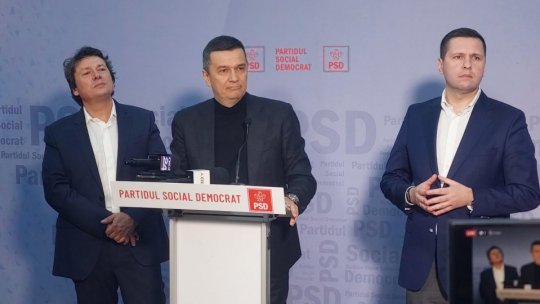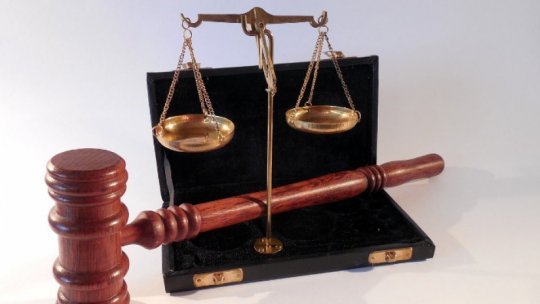We are NATO
Asymmetric war, terrorist threats, hybrid war, waves of migrants that assaulted Europe, cyber attacks - all these forced NATO to rethink its strategies.
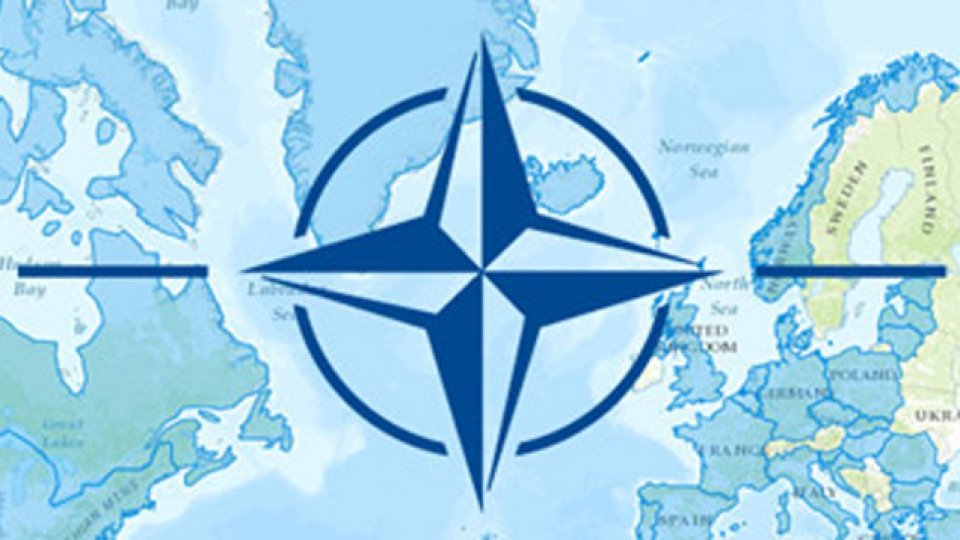
18 Decembrie 2017, 16:56
Romania's Strategic Partnership with the United States and its NATO membership represents the foundation for the alliances towards peace and security in the region. Over the recent years, we have witnessed recent history, which required the revision of all military doctrines, including those of NATO. Asymmetric war, terrorist threats, hybrid war, migratory waves that assaulted Europe, cyber attacks – all of these forced NATO to rethink its structures and strategies. This adaptation to new threats and security environments also required a reorganization of the Romanian Armed Forces; transformation of the General Army Staff into the Defense Staff that includes new Commands and Headquarters is part of adapting national Defense to new security challenges. In this complex configuration, NATO and the US Partnership remain the only real, functional options for Romania's border security.
RRA Military Reporter Radu Dobriţoiu discussed about the recently launched campaign entitled “We are NATO” during the “Euroatlantica” show of Radio Romania News (Radio Romania Actualități), broadcasted on 15 December, having as special guest Gen.Lt.(ret) Alexandru Grumaz, former General Consul of Romania to Shanghai, Military Analyst.
Radu Dobriţoiu: "We are NATO" is the theme of this edition, and Romania is part of this powerful Alliance - an organization primarily created to face the threat posed by last century’s USSR, an Alliance that has been very much adapted to the new challenges from the recent years, including to those coming from the current Russian Federation. How is Romania situated in this powerful military alliance?
Alexandru Grumaz: Romania is an important Member State of this Alliance – and it is not just me saying this. US Secretary of Defense James Mattis says that, by the voice of Thomas Goffus, who recently came to Bucharest. Goffus was one of those who prepared the NATO summit in Chicago and supported the concept of securing Baltic air space. And he is a very experienced man, being the deputy assistant to the US Secretary of Defense on issues related to the European Union and NATO. It should be noted that over the past two years, the Romanian army has received an impetus for its restructuring, through the General Staff remodeling and reorganization program, and its transformation into the Defense Staff; also by the setting, after the Warsaw Summit, of the Multinational Brigade in Craiova, an extremely important element for the Eastern part of the Alliance. Also, all the experience gained by Romanian soldiers in the theaters of operations in Iraq and Afghanistan proves its validity - and that is because Romania has participated this year in one of NATO's most important exercises in the Eastern area, "Saber Guardian 2017”. And here we are telling your radio listeners what this is all about: there were 25,000 troops from 22 countries, with over 3,000 technical means. Romania alone participated with 8,000 soldiers and 1,000 technical means. So we're talking about impressive figures: 70 train sets, 400 car convoys, 50 air racing and shipping.
Radu Dobriţoiu: And let us recall - we have already discussed about this exercise - that this technique, which was often hardly to maintain functional, did not fail. Even the American allies were impressed when they saw that there were no problems with our technique, with a maintenance that was well-organized by the Romanian army.
Alexandru Grumaz: Yes. We have to remember that this exercise has demonstrated that Romania is capable of acting in a theater of operations needing to be confronted with a river forcing, which has impressed everyone.
Radu Dobriţoiu: An extremely difficult, complex operation that took place in a very wide area of the Danube - forcing an assault and rejecting it on the Danube.
Alexandru Grumaz: Yes. In fact, all this was a NATO logistics testing operation, plus an operation to transport and treat the wounded in military operations with the deployment of campaign hospitals - that is, the deployment of forces was impressive, and this allowed the validation of the Romanian army's combat capability. Although we are deficient in the field of armament, since this year we have gone through an intensive program of army endowment.
Radu Dobriţoiu: And a real program, because so far, it was just on the paper.
Alexandru Grumaz: It is a program that has been approved by the Romanian Parliament. That is because Defense Ministers have been concerned about raising funds and ... Including the current (Romanian Defense, n.a.) Minister, Mihai Fifor, who has managed to pay the first payment for Patriot, which is something that has not happened so far.
Radu Dobriţoiu: Let us just remember what happened this year, and it is very important for the Romanian Army: we started the year with the introduction of the military service on a voluntary basis - again, an important aspect that has happened in the last two years and this year recruitment has began to ensure additional staffing for the MApN - we have Patriot, we have the decision to build Piranha 5 Armored Vehicle at the „Uzina Mecanică” in Bucharest; also Bell Helicopter, in Braşov, attack helicopters, Airbus transport helicopters, also in Braşov; there are talks about corvettes, anti-tank fighting equipment has been bought, and we went even as far as changing the combat uniform for all Romanian troops. These things happened very quickly.
Alexandru Grumaz: Yes, in terms of the army's endowment. But we also need to discuss issues related to the geopolitical situation of the area and about what we have to do - topics that were discussed at the Romanian Ministry of Defense by Thomas Goffus, as I started to tell you. Black Sea security was discussed - it was one of the most important topics. Another topic, on how to implement the assurance and adaptation measures agreed at the Warsaw NATO Summit - because we know that the two Summits, those from Wales and Warsaw, were extremely important to adjust the current situation to the threats coming from the East. And also the advanced presence adapted on terrestrial, maritime and air dimensions, as well as participation in missions in theaters of operations.
In fact, why do I say these things? Because a legitimate question that emerged and which we discussed in Washington with Admiral James Stavridis, the former SACEUR (Supreme Allied Commander, Europe - n.r.), the importance of the Black Sea. Because we are at the Black Sea and ...
Radu Dobriţoiu: General, about the importance of the Black Sea, let’s recall now, in a special context: Turkey is very close to Russia, Turkey has been talking very often lately about the desire to buy S-400 anti-aircraft systems from Russia. .
Alexandru Grumaz: ..it has even been discussed these days, when President Vladimir Putin stopped in Ankara, about the next phase of the S-400 system acquisition.
And I was telling you about the Black Sea ... There are a few things Admiral Stavridis said: First, NATO should strengthen its program of visits, drills and training missions in the Black Sea ports. This in fact means more frequent visits to Romania ...
Radu Dobriţoiu: A permanent rotation of ...
Alexandru Grumaz: Sure, yes, of the Standing NATO Maritime Group 2 (SNMG2) - the second group. It's the one from the North - the Northern maritime group...
Radu Dobriţoiu: Respecting the Montreux Agreement...
Alexandru Grumaz: Exactly, of course! With all the necessary conditions.
Second, the Alliance should develop and fund a coherent plan for maritime operations - hence the financing of such a plan - although some aspects of such an arrangement have already been included in various NATO operational plans. But a detailed analysis needs to be done. And one of the great advantages of NATO is its solid structure of permanent operational command - about 9,000 people dealing with this ... spread across the 29 nations.
Third, the US should increase its independent operations in the Black Sea. We know that in Rotta, Spain, there are four EGEAS missiles, permanently allocated to the Mediterranean and for protection against Iran's inter-continental ballistic missiles. So these ships should periodically enter the Black Sea....
And fourth, the US should work closely with Turkey, which really holds the Bosphorus keys. And a deepening of the partnership, of the relationship between the United States and Turkey, is already being discussed at the Pentagon.
General, let us remember that, in addition to the Bosphorus and the Dardannells - which are, of course, included in the Montreux Treaty and in many international agreements - Turkey is now working on a parallel channel to connect the Mediterranean and the Black Sea. Probably, in the future, that maritime channel will not be subject to these international agreements that are open to the countries bordering the Black Sea and will be a separate pathway to the Black Sea, coming from the Mediterranean.
Alexandru Grumaz: Or it may be the only pathway.
Radu Dobriţoiu: At one point, if the other one closes.
Alexandru Grumaz: Yes!
Radu Dobriţoiu: NATO supports Europe's security for 70 years, an alliance that has proven its effectiveness, an alliance that includes Romania. One of Romania’s commitments within NATO is to allocate 2% of its GDP to the Defense. Also, in return for the security provided by NATO, Romania needs to modernize and adapt its military structures to the current security challenges.
RRA Reporter Cătălin Purcaru participated in the "We are NATO" public information campaign in Romania, that was launched last week at the Faculty of Law of the University of Bucharest.
*
Reporter: In a world dominated by crises and conflicts, there is a need for a unitary, efficient and calibrated response, and it comes from the North Atlantic Alliance – Romanian Foreign Minister Teodor Meleşcanu said. NATO has demonstrated the capacity to adapt to the changes emerged in the global architecture, has ensured security in Romania for 70 years, through collective defense and its members, but also through partnerships with other states outside the Alliance. For Romania, NATO and the Strategic Partnership with the US represent the fundamental pillars of foreign and security policy - said Teodor Meleşcanu.
Teodor Meleşcanu: All these years, with all the moves that we have in the Parliament, on the streets, through the Press, Romania’s accession, participation and membership within NATO has been one of the few or perhaps the only theme that did not make the subject of contradictory debates.
Reporter: General Nicolae Ciucă, Chief of Defense Staff, assured that all obligations within the Alliance are being respected. From the participation of Romanian soldiers in missions in theaters of operation to the allocation of two percent of the GDP for Defense.
Gen. Nicolae Ciucă: At the end of the year, we will be able to report that the Army has been able to start major priority programs so as to contribute to everything that this part of the modernization and refurbishment of units and big units means.
Reporter: "We are NATO" information campaign, launched in May at the Headquarters of the North Atlantic Alliance in Brussels, is organized in several allied states and aims to increase young people's confidence in the capacity of the Alliances’ structures to protect the population and the territory of the Member States.
*
Radu Dobriţoiu: The public information campaign "We are NATO" in Romania was launched last week at the Faculty of Law of the University of Bucharest. The meeting with the students was attended by Romanian Foreign Minister Teodor Meleşcanu and the Head of the Defense Staff, General Nicolae Ciucă.
General Alexandru Grumaz, we have both participated in a meeting with the Romanian Defense Minister Mihai Fifor and the Head of the General Staff of Defense, Gen. Nicolae Ciucă. It was discussed, among other things, about the military Schengen, about the allies' desire to facilitate transit of countries with military technique, especially in situations not only with the purpose of exercises, but also for crisis situations.
Alexandru Grumaz: In fact, in Brussels, at the end of the two-day meeting of the Foreign Ministers, this was one of the topics discussed, and NATO Secretary General Jens Stoltenberg said they had already begun talks with the European Union to see where the problems are in reference with the first movement of the military, because it's a big problem, you've seen that, I've told you what impressive quantities, 70 train sets, 400 car convoys ... Well, these must have the possibility to circulate, not to be stucked at the border for three or four days, in order to pass from one side to another ...
Radu Dobriţoiu: 70 train sets, after all, were about 100 at the end of this exercise, which were used to deploy and to put into operation this Saber Guardian exercise.
Alexandru Grumaz: NATO can move troops across the European continent at any time, and there must be a rapid reaction in order to be able to deploy within the necessary or planned time to the areas of operations. These things were happening during the Cold War, when they moved very quickly from a ... General Breedlove said he was moving very fast from one area to another. For example, there was recently required a trip from Prague to Northern Europe in the Baltic countries, for two weeks. Russia does not have this problem, because it can rapidly, easily circulate in a very wide space.
Alexandru Grumaz: ..and the infrastructure over there is different from the European infrastructure. There are countries that have highways, there are countries that do not have highways, whatever ... Many times you just think of it, when you go to Cincu..
Radu Dobriţoiu: But they do not need approvals.
Alexandru Grumaz: And when you go to Cincu and see that you get off the asphalt on the road ...
Radu Dobriţoiu: This is how it is in Romania, General, and I think that’s the way is going to be for years to come.
Alexandru Grumaz: Let's hope that some steps will be taken to build the infrastructure, because on the infrastructure, on the motorways, the whole industry is developing, this is how the important countries of the West have developed.
Radu Dobriţoiu: NATO and the European Union have launched a new phase of cooperation by adopting measures that support military mobility and the fight against terrorism. The talks also referred to a so-called military Schengen, to ease the rapid deployment of forces and equipment.
*
RRA Correspondent from the United States, Doina Saiciuc - Last week, NATO and the European Union launched a new and important era of cooperation by agreeing a set of concrete proposals in seven areas. There are 32 new joint proposals for greater cooperation, especially on military mobility and the fight against terrorism - two areas for which the US has vigorously advocated over the past few months. General Ben Hodges, Commander of US Army Europe, called for a so-called Schengen Military Area to prevent bureaucracy from hampering a quick military response to a possible attack. Prior to last week's decision, General Hodges spoke in an interview about the differences between his ability to rapidly deploy forces and that of the Russian President Putin: "Putin can deploy a lot of equipment and force really fast, which caught my attention and I began to think about how we could at least reach at that speed". Because when General Hodges wanted to move tanks and heavy armaments to Europe, he had to stop at every national and even regional border for checks, to present a list of all the vehicles, the drivers, and what was in each vehicle. To get the crossing permit, in many of the European countries it can take weeks to do something like that. On December 5, NATO and EU leaders declared: "The rapid movement of forces and equipment is vital to our security". What NATO Secretary-General Jens Stoltenberg and the High Representative of the European Union, Federica Mogherini, said called for new procedures for rapid border crossing, simplification of bureaucracy and robust infrastructure: roads, railways, ports and airports.
*
Radu Dobriţoiu: General, RRA Press Correspondent in the US, Doina Saiciuc, also reminded of this relationship between the European Union and NATO, which should be improved and here we are talking first of all about the countries that are part of both organizations and who should support these NATO initiatives .
Alexandru Grumaz: First of all, I want to tell you one thing that seemed important to me: US Secretary of State Rex Tillerson, who was on a tour in Romania, having been asked at a press conference whether America will honor his commitments in Europe, has used the word "ironclad", which means cage or armor, referring to what America will do for Europe. So he will maintain this commitment to ensure security. Indeed, the current relationship between the US and Europe is a bit rough..
Radu Dobriţoiu: It seems the US doctrine is also changing ...
Alexandru Grumaz: The US doctrine is changing, the doctrine of Europe is changing, under the pressure of President Macron. So, there is this desire that the Defense industries in European countries to collaborate in R & D programs and for this reason, the European Union will allocate € 1 billion to Research and Development for the next few years. And, for the start, there are 15 programs in which we also signed up with our options to participate in these programs that the European Union is developing. It's important because there are funds that help us to ...
Radu Dobriţoiu: Can be attracted ...
Alexandru Grumaz: Exactly.
Radu Dobriţoiu: And there is more and more often discussed, general, about transferring back of the Defense industry from the Ministry of Industries under the Ministry of Defense (MapN) subordination. Do you think it would be a good decision?
Alexandru Grumaz: I say it would be a very good decision, because the Army always knew how to manage its resources. From the discussion we had with the Defense Minister, you were there and ...
Radu Dobriţoiu: Along with Colonel Ion Petrescu (military analyst) and Hari Bucur (national security expert)...
Alexandru Grumaz: You know I asked about the powder for ammunition ...
Radu Dobriţoiu: Yes. Which was produced in Făgăraş.
Alexandru Grumaz: In Făgăraş, yes, and which was closed ... Well, the Minister told us that the production lines for the powder would be reopened, which is an extraordinary thing.
Radu Dobriţoiu: General, we are approaching the end of the radio show, we were referring to NATO versus the Warsaw Pact; in 2018, we have NATO face to face with Russia, with Belarus, with all that the Russian Federation means. A new challenge for NATO.
Alexandru Grumaz: Yes, it is a new challenge, a challenge especially because Russia invests a lot in the Defense industry and has built a system of anti-access and "access deny" in the Eastern area of NATO. It is extremely important that we have this Strategic Partnership with the US, we rely on it, a Partnership that has brought US troops to this area.
Radu Dobriţoiu: It brought Deveselu, which means defending the airspace, Patriots ...
Alexandru Grumaz: This collaboration and this Partnership have brought us ... Well besides that, according to what was decided at the Warsaw Summit, it has brought us not only American soldiers here, we also have soldiers from the allied countries - German, Italian, Polish ... So this cooperation is very good.
Radu Dobriţoiu: In this edition of “Euroatlantica” show at Radio Romania News (Radio Romania Actualități), we have discussed about the modernization and adaptation of NATO to the new security concerns. Thank you for your attention!
Source:RRA.Translated by Miruna Matei

